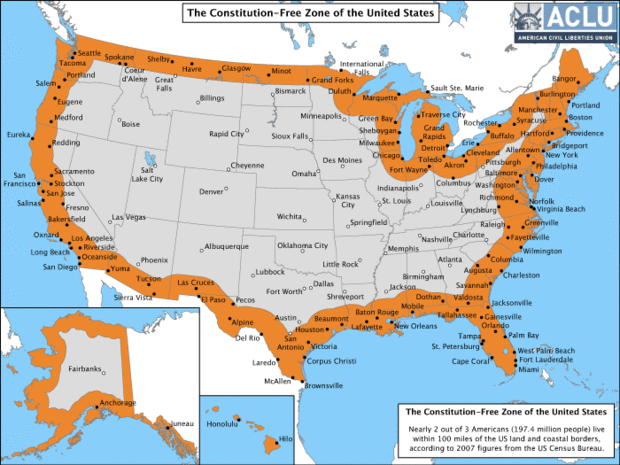Judge Upholds UnConstitutional Searches Within 100 Miles Of Borders
This week, U.S. District Judge Edward Korman in New York upheld an Obama Administration policy that allows the Federal government to deny 4th Amendment protections within 100 miles inland from the Nation’s border.
Ruling on a nearly 3-year-old challenge brought by the American Civil Liberties Union, Korman said that the so-called “border exemption” that allows officials to search individuals near the border without reasonable suspicion should continue to include searches of electronic devices and computers.
Saying that it would be “foolish, if not irresponsible” to have anything on a device that a person wouldn’t want seen by officials near the border, Korman ruled: “Laptops have only come into widespread use in the twenty-first century. Prior to that time, lawyers, photographers, and scholars managed to travel overseas and consult with clients, take photographs, and conduct scholarly research. No one ever suggested the possibility of a border search had a chilling effect on his or her First Amendment rights. While it is true that laptops may make overseas work more convenient, the precautions plaintiffs may choose to take to ‘mitigate’ the alleged harm associated with the remote possibility of a border search are simply among the many inconveniences associated with international travel.”
While the judge focused on the implications of the searches for people traveling back and forth across the border, the invasive and unConstitutional searches will actually be permitted a full 100 miles into U.S. territory.
The ACLU illustrates the so-called “Constitution Free” zone in the map below:
The civil liberties organization says it is mulling an appeal to Korman’s ruling.
“We’re disappointed in today’s decision, which allows the government to conduct intrusive searches of Americans’ laptops and other electronics at the border without any suspicion that those devices contain evidence of wrongdoing,” said Catherine Crump, the American Civil Liberties Union attorney who argued part of the case. “Suspicionless searches of devices containing vast amounts of personal information cannot meet the standard set by the Fourth Amendment, which prohibits unreasonable searches and seizures. Unfortunately, these searches are part of a broader pattern of aggressive government surveillance that collects information on too many innocent people, under lax standards, and without adequate oversight.”

No comments:
Post a Comment
Thanks for commenting. Your comments are needed for helping to improve the discussion.